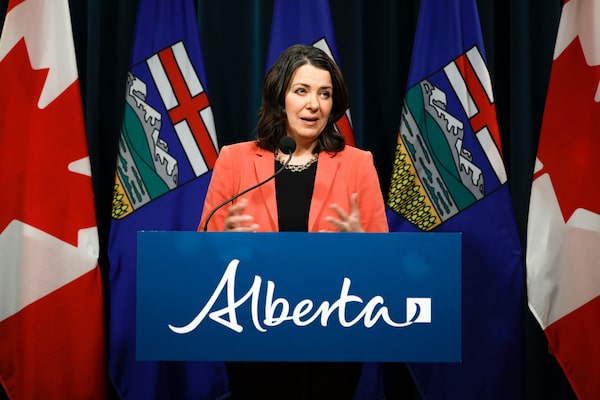
Premier Danielle Smith gives an Alberta government update in Calgary on Jan. 10.Jeff McIntosh/The Canadian Press
Alberta will soon release an emissions reduction and energy development plan, Premier Danielle Smith said this week, as the province grapples with how to preserve its oil and gas industry in the face of increasing pressure to reduce the sector’s environmental footprint.
Ms. Smith will also plumb the advice of a new Premier’s Advisory Council on Alberta’s Energy Future, formed this week to develop a long-term vision for the province’s energy future. In its report, due June 30, the five-member panel will recommend steps the province should take to ensure the energy industry thrives over the coming decades.
Alberta’s oil and gas sector, and its role in the net-zero future Canada is aiming for, has long been a point of contention for the province’s United Conservative Party government. The UCP argues that the federal Liberals’ push toward reducing greenhouse gas pollution – including a cap on emissions from the fossil fuel sector – is unrealistic and will do irreparable harm to the sector and the country’s economy.
Ms. Smith has railed against the cap in various letters to Prime Minister Justin Trudeau, including one she sent this week in which she proposed working collaboratively with the federal government to aggressively advance emission-reducing technologies in Alberta (particularly carbon capture, utilization and storage) and increasing liquid natural gas exports.
Danielle Smith invites Trudeau to work ‘in partnership’ with Alberta but has a list of demands
She said Alberta would like to incorporate both proposed federal-provincial initiatives into a soon-to-be-released Alberta Emissions Reduction and Energy Development Plan, though her office provided no more information on the timeline of that plan, details on what it might include, or how heavily it will rely on the advice of the Premier’s new advisory council.
The panel has been charged with conducting research, gathering input from experts and preparing analysis. The idea is to develop a cross-ministry approach, with the panel set to engage with various departments including finance, energy, environment, utilities and municipal affairs, and industry.
Chair of the panel is David Yager, a well-known Alberta oil and gas figure, policy analyst, writer and consultant. Mr. Yager was also chair of the Petroleum Services Association of Canada, and wrote a book about Alberta’s fossil fuel sector called From Miracle to Menace.
He is also the former president of the Wildrose Party, which Ms. Smith led in opposition before she and eight of her caucus crossed the floor to the ruling Progressive Conservative Party in 2014. Her decision has been widely credited with playing a role in the NDP’s victory in the 2015 Alberta election.
Mr. Yager will be entitled to $10,000 a month for his work on the panel.
He said in a statement that with industry leaders already commercializing innovative emissions-reduction technologies and leading the way in tackling the world’s biggest energy challenges, the panel will “lay out clear recommendations that ensure this work is supported and continues well into the future.”
He will be joined by Hal Kvisle, Bob Curran, Carey Arnett and Phil Hodge, who will be paid according to Alberta’s committee remuneration orders.
Speaking about a range of energy issues at the National Coalition of Chiefs Clean Energy Summit just outside Calgary on Friday afternoon, Ms. Smith also criticized Ottawa’s sustainable jobs plan, released just hours before.
She said she was particularly disappointed that the document made repeated mention of Canada’s emissions reduction plan, which aims to mandate reductions in emissions by 40 per cent below 2005 levels by 2030. She argued it’s “unrealistic” without oil and gas production cuts and “has the potential to be devastating to this province.”
Federal Minister of Natural Resources Jonathan Wilkinson countered in a statement that “Canada has what it takes to become the clean energy and technology supplier of choice in a net-zero world,” and the plan would ensure that Canada’s workers “have the skills and support necessary to seize this generational opportunity.”
The federal document defines a “sustainable job” as any job that is compatible with the country’s path to a net-zero emissions and climate resilient future – which holds particular significance in Alberta, the heart of Canada’s oil and gas sector.
It lists a series of 10 actions the federal government plans to take between now and 2025, including establishing a sustainable jobs secretariat, creating a sustainable jobs partnership council, earmarking funds for sustainable jobs skills development, and promoting Indigenous-led solutions and a national benefits-sharing framework.
 Emma Graney
Emma Graney